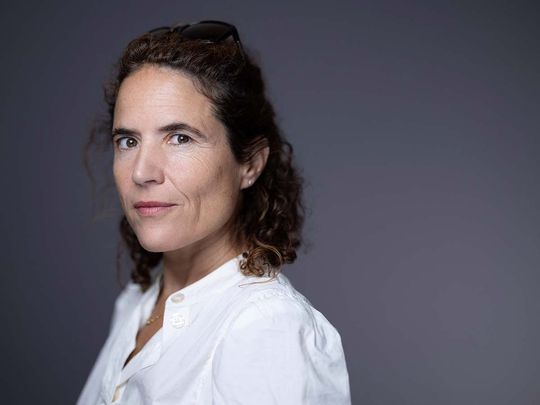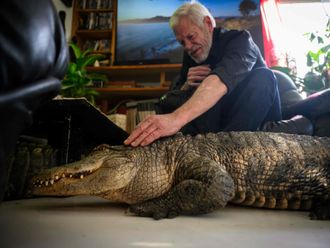
PARIS: The love child of former French president Francois Mitterrand never thought that visiting the Paris apartment where she grew up hidden from the public view would be so easy.
From the age of 9 to 16, Mazarine Pingeot, the daughter of Mitterrand and his longtime mistress Anne Pingeot, lived in a 300-square-metre (3,200-square-foot) apartment in the historic Palais de l'Alma, built under Napoleon III in Paris's 7th district.
More than 30 years later Pingeot, an accomplished writer, was invited to take a trip down memory lane, receiving permission from President Emmanuel Macron and the current tenants to spend 24 hours in her old apartment on the Quai Branly, overlooking the Seine.
The apartment is inside a complex owned by the French state that houses civil servants working with the presidency.
"I didn't think my editor would manage to get it. It was miraculously quick!" the 49-year-old novelist told AFP in an interview.
"I could not really imagine it at first. When I said yes, I thought: it's fun, it's interesting, it's an adventure," she said of the experience she recounts in her new book, "11 quai Branly", published Wednesday.
The journey into the past was bittersweet.
"It was a secret life, where I couldn't do much. When you're in hiding, you can't do anything," she said, adding that she sympathised with "people on the run".
"I had virtually no initiative. And I didn't claim any. My parents didn't forbid it: I'd accepted that condition."
Kept hidden from the world for two decades, Pingeot grew up surrounded by bodyguards.
"I really liked the gendarmes because they were the people I rubbed shoulders with," she said. "That's not normal, that relationship with the world that's always filtered. Everything was kept on a very short leash."
Her existence was revealed in a Paris Match expose in November 1994.
Pingeot said her experience was "unique in its extreme nature".
"It's not so unique, but in its proportions it's radical. I'm convinced that all the things I'm talking about are things that lots of children have experienced, from the fear, to the loneliness, to keeping things to themselves."
What makes her stand out, she said, was "the identity of a very famous father. It's perhaps more complicated."
But she added that many other people also deal with secrets including the identity of their parents, which she said was "never easy".
"What interests me is trying to write something that everyone can relate to," Pingeot added.
'Tenderness'
It is now eight years she changed her name officially to Mazarine Mitterrand Pingeot, a move she did not publicly reveal for a long time.
This is her first book she has signed with the name "Mazarine M. Pingeot".
Her narrative is recounted in the matter-of-fact style as she keeps her emotions in check.
"It has to do with the way I write, and perhaps the way I am," Pingeot said.
"That's the way I was brought up: in my family, we didn't show our feelings too much. There was tenderness, my parents weren't cold people," she said, adding that her grandparents did not "open up a lot".
Under the terms of the agreement, she was allowed to spend 24 hours in the apartment.
She arrived one afternoon and left in the evening, thinking she would not be back. But her own daughter had questions and wanted to see more photos so she returned again.
What she remembered most about the place was the space, she said.
"Almost more than what happened inside. What was going on there was just everyday life. Nothing else happened there: no impromptu visits, no big parties," she added.
"I remembered the space perfectly. But a lot has changed."
The flat has been renovated, and the carpet has been removed to restore parquet floors.
"It looks nicer. But it's still impersonal," she said.
Pingeot, who writes both fiction and memoir, said she enjoyed sharing her story again.
"I love this work," she said. "But I wouldn't have done it if I hadn't been commissioned to do it."












